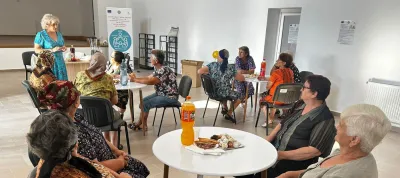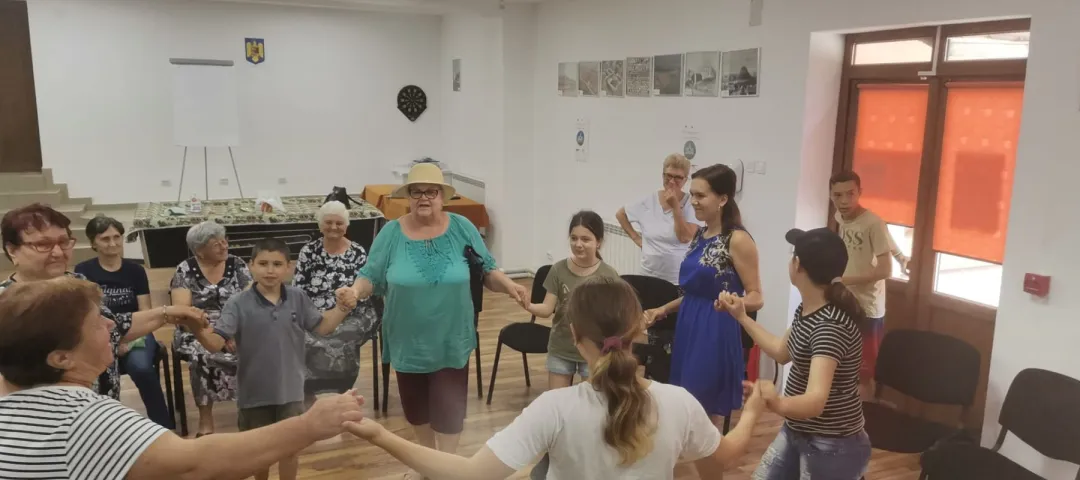General information
RDP Priority
- P6. Social inclusion and local development
RDP Focus Area
- 6B: Local development
RDP Measure
- M19: LEADER/CLLD
Beneficiary type
- Public authority / body
Summary
LEADER's ability to support multi-funded local development actions has been successful in establishing new social services for vulnerable families in a Romanian rural community.
This good practice project used CAP funds to help convert a disused cinema building into a modernised and well-equipped community facility. CAP supported the transformation of the building, allowing the European Social Fund (ESF) to be used for introducing new specialised social inclusion services for priority vulnerable groups, such as children living with grandparents while parents work abroad.
Project services include capacity building for parents and children in life skills that can be applied to help overcome difficult situations that endanger children's development, or that generate risks of separating children from their family environment. Elderly residents also now receive better social care thanks to this LEADER project.
Results
The transformed cinema building now provides an impressive 385 m2 of community space.
The project's two social centres were officially launched in June 2023. These new community facilities and social services help reduce gaps in rural service provision compared to urban areas.
More than 100 children and their families have received social services aimed at decreasing school dropout, preventing social exclusion, addressing domestic violence, and promoting overall well-being.
Roma minority members (often facing discrimination and marginalisation) receive tailored support that promotes their inclusion and empowers them to overcome systemic barriers.
The project represents a remarkable achievement, transforming a once-dilapidated structure into a vibrant hub of support and empowerment. The success has reinforced confidence for more community-led local development.

Promoter
Isaccea TAU
Funding
Total budget 228 349 (EUR)
RDP support: 179 730 (EUR)
Private/own: 48 619 (EUR)
Other: Human Capital Operational Programme (POCU) 862 527 (EUR)
Keywords
Resources
Documents
Context
Supporting vulnerable families in rural areas can help yield economic benefits that extend beyond immediate welfare assistance. By investing in enhancing the well-being of vulnerable populations, governments can stimulate long-term economic growth. This can lead to reduced reliance on social services and public assistance, as families become more self-sufficient.
Providing adequate support for vulnerable families helps to better position them for education and employment, increasing workforce participation, boosting overall productivity and contributing to more robust economies. A well-educated workforce also attracts businesses better, fosters innovation, and enhances global competitiveness.
In the Romanian rural town of Isaccea, challenges can exist for young people to find economic opportunities, and younger adults leave the locality to work in cities or abroad. As a result, children are left in the care of grandparents or other relatives. An important part of the area's population is represented by vulnerable people, with very low incomes and a low level of schooling, or at risk of dropping out of school.
One third of the population (more than 1 000 people) is over 60 years old. In 2016, a total of 30 children were registered in Isaccea in difficult situations that could endanger their development, or that would generate risks of separating children from their family environment.
Nearly 100 more children had a parent or both parents working abroad. Opportunities were identified for a multi-fund LEADER project rehabilitating a former cinema into a community social care centre for vulnerable groups at risk of poverty or social exclusion. It combined CAP LEADER funds with support from the European Social Fund (ESF).
Objectives
CAP funds aimed to help modernise a community facility to provide new local social services funded by the ESF. The multi-fund project would combine rehabilitating and equipping a former cinema (built by local youth in the 1940s) to modern standards for two licensed social services. These would help parents and children to overcome difficult situations that endanger child development, or that generate risks of separating children from their family environment, or to cover children's needs.
Other multi-fund project objectives sought to:
- improve employment prospects for at least 126 people at risk of poverty or social exclusion (through advisory services, qualifications, and entrepreneurship measures).
- combat discrimination and improve living conditions for at least 124 people by providing washing machines and specific packages for maintaining home hygiene.
- strengthen parents' skills and knowledge for childcare and education.
- support equal opportunities, rights, and access.
- improve possibilities for socialising and free time.
Activities
The cinema building's restoration work supported by CAP involved improving foundations, walls, external space, floors, roofing, pavements, plumbing, electrics, and heating systems.
Project costs also covered the building's new office equipment, flip charts, blood pressure monitors, exercise equipment, mirrors, thermometers, sofas, tables, television sets, and board games, enhancing its ability to serve the community's needs.
ESF assistance supported the development, launch and running of these useful new social services for vulnerable families in the rural area.
Main results
The transformed building now provides an impressive 385 m2 of community space.
The project's two social centres were officially launched in June 2023. These new community facilities and social services help provide a level playing field for social services, reducing gaps in rural service provision compared to urban areas.
The project represents a remarkable achievement, transforming a once-dilapidated structure into a vibrant hub of support and empowerment. The success has reinforced confidence for more community-led local development.
More than 100 children and their families have received social services aimed at decreasing school dropout, preventing social exclusion, addressing domestic violence, and promoting overall well-being.
Roma minority members, often facing discrimination and marginalisation, receive tailored support that promotes their inclusion and empowers them to overcome systemic barriers. Four representatives of the Roma minority have benefited from integrated social services, promoting inclusion, and addressing the unique needs of this marginalised group.
For elderly individuals, the project provides essential support and companionship, as well as opportunities for reducing isolation and promoting well-being.
Children and families benefit from interventions that address the root causes of their challenges, enabling them to break cycles of poverty and exclusion and better reach their full potential.
Key lessons
Supporting vulnerable families can reduce societal costs, and such proactive investments aimed at supporting vulnerable community members not only benefit individuals but can also yield useful public savings over time.
This approach to social support highlights the community's commitment to inclusivity and empowerment, ensuring that everyone has opportunities to better reach their full potential. By addressing the unique needs of vulnerable groups, the project fosters a more resilient and equitable society where people feel valued and supported.
By creating this centre, children from vulnerable families have a place where they enjoy coming to learn new things and spend quality time with other children in an environment where they feel safe.
The centre organises activities for the elderly, who would otherwise have been excluded from the life of the local community.
Parents from vulnerable families have the chance to make the best decisions for their children's future, being correctly and fully informed about the opportunities they can capitalise on for their children.
Dorina - Adriana Mihail

